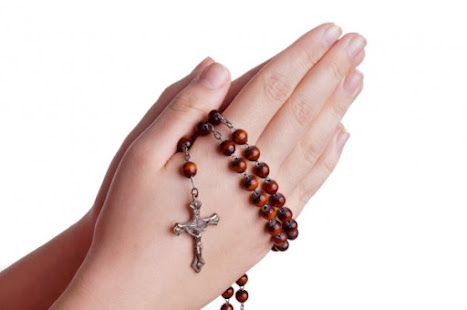Dear Friends,
When our Sister Mary Kay Ryan was presented at her wake and
funeral last week, she had in her hands a rosary that was passed down through
three generations of Sisters of Saint Joseph before her – all relatives who had
spent their lives in our Congregation. The practice of holding these beads in
the coffin is a longstanding practice among some older Catholics. But today,
many younger Catholics are unfamiliar with the rosary, its value and meaning.
They don’t pray the rosary and might not even know how.
This blog is not intended to be a primer, but an
encouragement to use this simple tool – the rosary – to keep before us significant
events in the life of Jesus, and to honor Mary, His Mother, who had said the
“Yes!” that brought the Word of God into our human reality in a way that has
been decisive for all time.
Long before Saint Dominic gave us the rosary in 1214,
meditations on the life of Jesus, the Lord’s Prayer, and the Angelic Salutation
to Mary by the angel Gabriel were commonly used in prayer. In the rosary, Dominic
gave people a way of organizing these prayers in an attractive way.
The Rosary was sometimes called the Psalter of Mary, because
like the 150 psalms, the rosary was comprised of 150 Hail Mary’s, prayed in
decades or groups of 10, between an Our Father and a Glory be.
After the Battle of Lepanto in the Gulf of Patras on October
7, 1571, when the Catholic European nations (The Holy League) defeated the
Ottoman Empire, Pope Pius V declared October 7 to be the feast of Our Lady of
Victory, because praying the rosary was understood as a significant religious
reason the battle was won. Later, the name of the feast was changed to the
feast of Our Lady of the Rosary, and this is how we know it today.
Because he believed that some important aspects of Jesus’
life were missing from the traditional way in which the rosary was prayed, St.
Pope John Paul II, in 2002, added the “luminous” mysteries which focused on
Jesus’ life from his Baptism by John to His self-giving at the Last Supper. After
that, as a church, we lost the “Psalter” concept, but came to pray in a fuller
way the meaning of Christ’s life.
As the beads slip through my fingers while saying the
rosary, I sometimes concentrate on the mystery, sometimes on the words of the
Hail Mary. There’s no one right way to say the rosary, but I have found, over
the years, that the rosary takes me to another level of thought and prayer and
gets me out of my own local world, local prayer, local needs. The rosary is a portable
tool for prayer. We can carry it in the car to use as we drive along, on our
bedside table to use while going to sleep or in our pocket for anytime,
anywhere.
I realize that I have given you little detail about saying
the rosary. Go ask someone to help you with that. My wish today is to encourage
you to find or find again value in this form of meditative prayer. Pope Francis
openly says, “The rosary is a prayer that always accompanies me. It is the
prayer of ordinary people and saints. It is a prayer from my heart.”
Like Pope Francis, the editor of Give Us This Day,
Mary Sommes, encourages us to pray the rosary. “These mysteries – sorrowful and
joyful, glorious and luminous – are full-on encounters. Encounters with Jesus
and Mary, with the Communion of Love within the Trinity, with the Communion of
Saints in heaven. And on earth.”
~ Sister Joan Sobala

No comments:
Post a Comment